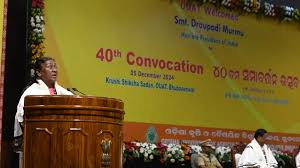Speaking at the Odisha University of Agriculture and Technology (OUAT) convocation ceremony in Bhubaneswar on Thursday, President Droupadi Murmu stated that the growth of agriculture and farmers is essential to the nation's overall development.
President Murmu asserted that the growth of livestock, fisheries, and agriculture could bolster India's economy. She added that natural disasters, the negative consequences of climate change, smaller farms per person, and overuse of natural resources are some of the new issues facing agriculture.
Our scientists will need to create and distribute technologies in a timely manner in order to address these issues. President Murmu stated, "We must prioritize the preservation of the environment, the health of the soil, the conservation of water and soil, and the more efficient use of natural resources."
"Agricultural production is being impacted by climate change-related problems like rising temperatures and increases in greenhouse gases. It is a significant duty of agricultural scientists to address all of these problems. Another new issue facing our agriculture industry is the overuse of chemical pesticides and fertilizers. Everyone is concerned about their detrimental effects on the environment, water, and soil. She added, "I have faith that young scientists will figure out how to solve these issues.
"The convocation day opens the path to the promising future of students," the president said. She informed the students that they are now entering a new ecosystem where they will be put to the test in real-world scenarios, requiring them to demonstrate their knowledge and abilities.
They are supposed to use their newly acquired knowledge and skills to the fullest extent possible in order to aid in the development of the country. She exhorted them to use their creative thinking and committed actions to support the national objective of making India a developed country by 2047.
"We used to be reliant on other nations for our food grains." Food grains and other agricultural products are now exported. Our farmers' unceasing efforts and the direction of our agricultural scientists have made this possible," she said.


.jpg)
.jpg)
.jpg)

.jpg)
